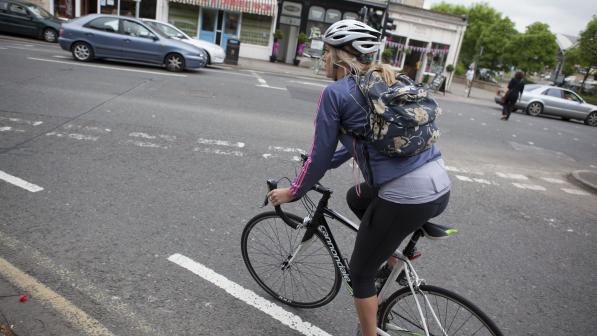10 things I wish I’d known about commuting

Like many others, after regularly cycling to school as a child I stopped riding my bike for many years. Then while studying at university and living a couple of miles from campus, I borrowed an old bike from a friend and realised how convenient cycling was to get around.
Since then, I’ve commuted to most jobs: sometimes it’s been a quick ten-minute cycle ride to the office; other times I’ve ridden ten miles across London, and since starting my role at Cycling UK, I ride the beautifully scenic seven miles along the river and into Guildford.
Here are the top 10 things I wish I’d known before that very first cycle commute:
1. How to fix a puncture
When I started cycling to my first job after university, my route was along a quiet and hilly country lane. The journey was around three miles and there were no shops or houses along the route. Not the greatest time to get a puncture.
I now know how to fix a puncture myself, but it’s not something they teach you when you go to buy your first cycle. Luckily, Cycling UK has a handy video guide you can watch.
2. How valuable a waterproof saddle cover is
There are few things I find more annoying than a soaking wet seat on my bike, especially if I’m about to do a mid-day ride to a meeting.
I wish I’d discovered sooner that you can pick up a cheap waterproof cover for your bike seat and it can make the world of difference to your cycling comfort.
There are plenty of affordable options out there, Sustrans even has a branded cover for just £2.50.
3. That I don’t need to buy special clothing
There was a point on my long cycle ride across London where I’d wait with many other cyclists to cross the roundabout near Buckingham Palace and I’d look at what people were wearing. Some were decked out in full lycra outfits, some were on hire bikes in suit and ties and others were on their fixie bike in smart jeans and shirts.
At first, I felt out of place wearing my old leggings and oversized t-shirt, but after a while, I realised that just like types of bikes, people’s clothing options are just as varied. As long as you’re comfortable there’s no necessity to purchase any special attire.
More about what clothing to wear on a bike ride.
4. That even a short commute has an impact on my fitness
You don’t need a long cycle commute before the benefits of your ride start having an impact on your physical health. Just a 15-minute ride, there and back to work, five days a week is enough for you to hit the recommended activity levels for the week.
More about how cycling positively impacts your health.
5. Cycling UK has a journey planner
When I first started cycling to university, I cycled the way I would usually drive, down busy main roads and following the most direct route. Then when I began cycling in London, my first few trips were spent mostly stopping so I could check Google Maps every few turns.
Thankfully, someone recommended the Cycling UK journey planner and a mobile phone holder and I was able to plot my route along either the quietest, balanced or fastest route.
Being able to cycle along quieter streets had a huge impact on my journey. I was more relaxed, able to increase my confidence at my own pace and enjoy my ride more.
6. How to cycle in traffic confidently
It’s easy to feel intimidated by other road users and feel like you need to give way to bigger vehicles, or even stop to let cars pass you on narrower stretches of road.
I wish I had watched Cycling UK’s video guide on road positioning and tackling junctions to ensure I was cycling in the safest way possible.
7. Cycling UK’s online resources
I was pretty green when I started commuting, and in a world where cycling is a normal transport choice, where there is better cycle infrastructure and less motorised traffic, this wouldn’t be an issue.
It is Cycling UK’s vision to see people opt to hop on their cycles for most short journeys. However in the UK there are still things we need to consider:
- Where will I lock my bike?
- How do I plan my commute?
- How do I cycle in traffic?
- Do I need cycle insurance?
Luckily, Cycling UK has the answers to almost any question you might have about commuting. I just wish I’d read it all sooner.
8. How cycling could improve my mental health
Everyone knows about the importance of getting outside and exercising. For many of us, that’s easier said than done when you have a busy schedule and no free time to dedicate to exercise.
I wish I’d known that I didn’t need to separate out exercise from my work commute. I can get my daily exercise in at the same time as having a convenient way to get to work. The results on my mental health are the same. I even concentrate better when I get to work.
More about the mental health benefits of cycling.
9. How to arrive at work looking fresh and clean
It’s true that for many people, there are lots of ways to keep yourself from getting too sweaty on your cycle commute, like taking it easier when riding or even investing in an electric bike.
I have to be honest though, if you’re like me, no amount of easy riding will prevent you from getting a bit hot under the collar.
Being sweaty is a reason many of us feel like we can’t make the switch to cycle commuting, but it's just a case of finding what works for you. Some people are able to ride in their work clothes, take it easy and arrive fresh as a daisy.
I wish I had known that all I needed to do was cycle in different clothes and bring my work attire with me.
More about how to look smart when cycling to work.
10. Not all employers are equal when it comes to being cycle friendly
I am very lucky to work for a cycle friendly employer. We have shower facilities, a drying room for cycle clothes and safe cycle storage.
Not every workplace is so cycle friendly. I have hung my wet cycling clothes in communal bathrooms, over the back of my chair and over the office radiator. Of course this may not be appropriate or possible where you work.
Why not suggest to your workplace that they look into becoming a Cycle Friendly Employer? There are benefits both to you as a cyclist but also to your employer.
Cycling UK runs accreditation for this international benchmark for active travel culture and infrastructure in the workplace.
More about how to become a Cycle Friendly Employer.









